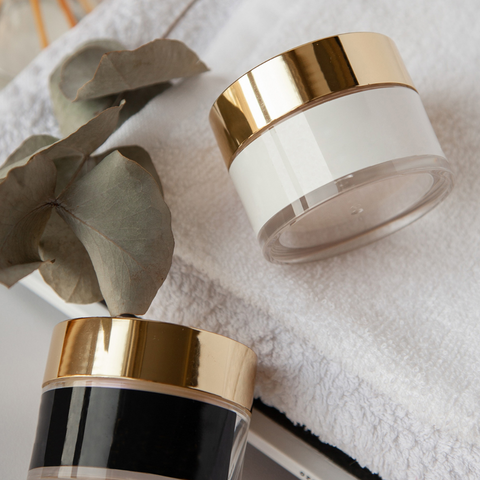RETINOL - WHAT IS IT?
Retinol is the undisputed king of skin care in recent seasons. Its multidirectional action gives truly spectacular effects, and when used properly, it is suitable for all skin types. However, retinol is not the only active ingredient belonging to the group of retinoids. So check what else is worth considering when planning your autumn care.
RETINOIDS - TYPES AND HOW DO THEY WORK?
Before you decide to apply any of the substances belonging to retinoids to your face, it is worth doing a basic lesson in chemistry.
Retinoids are derivatives of vitamin A and are divided into 3 groups:
I generation - retinol, retinal, tretinoin, isotretinoin. These are active ingredients known primarily to people struggling with acne and those who use anti-wrinkle treatments.
2nd generation - etretinate, acitretin. These derivatives have more advanced effects and are used to treat psoriasis.
3rd generation - adapalene, bexarotene, tazarotene. Synthetic derivatives of vitamin A, which are also used to treat advanced stages of acne or psoriasis. They have a very specialized effect and their use must be consulted with a doctor.
IV generation - tripanoid and seletinoid G. The latest generation of retinoids still undergoing research.
Most of the above names sound complicated and unless you are struggling with serious skin lesions, it is actually worth remembering two of them - retinol and retinal. So how do they work?
RETINOL ACTION
Retinol, like vitamin A, dissolves fats very well, so they easily penetrate into the deeper layers of the epidermis. Vitamin A itself is called the "vitamin of youth" and this term also applies perfectly to retinol. It has a typical anti-aging effect, i.e.:
- reduces wrinkles,
- increases collagen synthesis in the dermis,
- reduces discoloration.
But not only! The benefits of retinol can be used both by people who simply want to reduce the signs of aging, but also by those who count on its anti-acne effects. Retinol can:
- reduce skin seborrhea,
- reduce blackheads
- soothe inflammation, including pimples,
- speed up the skin healing process.
HOW IS RETINOL DIFFERENT FROM RETINAL?

First of all, retinal is gentler on the skin than retinol. It works equally effectively, but causes less irritation - so it is a better choice for sensitive skin. It can also be used year-round.
So what should you choose - retinol or retinal? It depends ;) It depends on the individual preferences of your skin and the effect you want to achieve. In the case of both ingredients, the most important thing is to properly introduce them into your daily care.
HOW TO USE RETINOL?
Both retinol and retinal can cause skin peeling, dryness, and slight irritation, so remember to ensure proper skin hydration - TONIK DASH and SERUM DRIP will help you with this. Therefore, the safest way is to gradually build your skin's tolerance to this ingredient and initially use it 1-2 times a week. After about 2-3 weeks, you can increase the frequency of applying cosmetics with retinoids to 3-4 times every day. So do you have to use retinoids every day? No, apply them to your face as often as your skin requires. Remember, however, that systematicity is the key to success. Also, be patient because you have to wait to fully enjoy the effects of using retinol or retinal. However, we assure you that it is worth it!
WHICH CONCENTRATION OF RETINOL SHOULD I CHOOSE?
Most often, the concentration of retinoids in cosmetics available in drugstores ranges from 0.3% to 2%. As you increase the frequency of application of the substance, you can also gradually increase its concentration. Building skin tolerance is a laborious process, and it may also happen that sometimes you need to take a step back and, for example, return to a slightly lower concentration. If you prefer retinal to retinol, you can use a slightly higher percentage of this ingredient.
Can retinoids be used in summer?
If your skin has a high tolerance to retinol and you remember to use a high SPF at the same time, then yes, you can also use them in the summer. However, if your skin still does not fully agree with retinol/retinal, you are planning a trip to very hot, sunny places or you do not always remember about sunscreen, it is better to leave these types of active ingredients for the colder seasons.
BAKUCHIOL OR RETINOL?

Some time ago, an ingredient called bakuchiol was hailed as the new retinol or "plant-based retinol". And although they have similar effects, this term should definitely not be used. Why? For a simple reason - they are simply substances with completely different chemical structures. So what to choose? The answer is also not clear. Bakuchiol is certainly gentler on the skin, is vegan, and can be used by pregnant women (while retinoids are not recommended). In turn, retinol is an effective anti-wrinkle and imperfection-reducing ingredient known for many years with unquestionably proven effects.
Sounds complicated? Not true! Just start! The multitude of preparations and their different concentrations mean that you will certainly find a product for yourself. However, the most important thing is regularity, observation of the skin and, if in doubt, consultation with a doctor.


